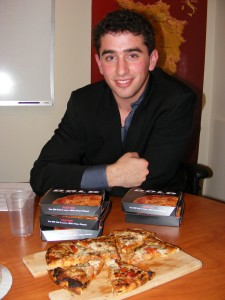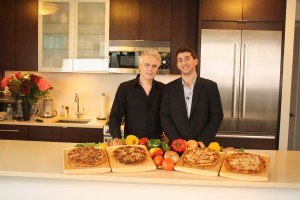
In a public relations agency”™s Chelsea office, Aaron Greenwald co-hosted a Friday pizza party whose invited guests from the press were far and away his elders. Along with hot-from-the-office-toaster-oven slices of his startup company”™s gluten-free pizzas, Greenwald served a spirited patter of savvy business talk that belied his 20 years and an eager, boyish face unaltered by time and ruinous college habits since its appearance in his Scarsdale High School yearbook.
It was about four years ago when Greenwald, a high school tennis player carrying 20 to 30 extra pounds onto the court, started on a gluten-free and dairy-free diet recommended by a nutritionist.
“About two months later, I lost 20 pounds,” he said. Chalk up another youthful convert to the gluten-avoiding, ingredients-label-reading life.
Shopping at Whole Foods in White Plains for gluten-free delectables, “There was nothing near anything you could eat that tasted like anything you eat,” said Greenwald. Ring up another hungry American entrepreneur in the making.
At Washington University in St. Louis, Mo., Greenwald studied architecture in his freshman year to lay a foundation for his planned career as a real estate developer. On that path he followed his father and business adviser, Drew Greenwald, a trained architect and president of Grid Properties Inc. in Manhattan, the developer of Harlem USA, a 285,000-square-foot retail and entertainment complex at 125th Street and Frederick Douglass Boulevard.

His architecture courses taught him problem-solving and “thinking outside the box,” lessons “that helped me create a great platform and grow the business to where it is now,” said Greenwald, founder and president of BOLD Organics. His company, whose line of frozen-pizza products in January will launch in more than 200 grocery stores from California to Florida, has an office in his father”™s Harlem USA building.
Switching to a business major in his sophomore year, Greenwald learned elements of business law he would soon apply outside academia. In an introductory course on entrepreneurship, he presented his ideas for about 15 gluten-free food items.
“I saw a tremendous market for gluten-free,” he said. His vision was supported by market surveys. The market research firm Packaged Facts reported that the U.S. market for gluten?free foods and beverages has grown by 30% a year since 2006 to $2.6 billion in 2010. Gluten?free sales are projected to exceed $5 billion by 2015.
A year ago, Greenwald took a one-year leave of absence from college to start a company that he aims to make “the brand leader in gluten-free foods.” Backed by a private-equity firm and angel investors ”“ he declined to disclose startup investment costs ”“ he ventured boldly if rather naively into the American food industry.
“I thought I could build this business in three months and open in March. I had no idea of the scale and size of everything.”
In St. Louis, Greenwald brought in as his business partner an acclaimed local chef, Eric Brenner, a 42-year-old restaurant owner, operator and consultant. The partners began experimenting with products, some of which eventually will follow BOLD Organics personal-sized pizzas onto supermarket shelves.
“This is a great way for a chef to make an impact on a broader scale,” Brenner said at the New York wine-and-frozen-pizza party. There he spoke with culinary zeal of “that crunchy, chewy sensation” of thin crusts made of brown rice flour laced with cornmeal, composing a sauce “where we could really soar,” the marvel of cheese-free but cheesy-tasting vegan mozzarella and the impossibility of making pizza pockets for gluten-free eaters.
“Without the gluten, they wouldn”™t close,” said Greenwald.
“They were turnovers,” said Brenner.
For the college student on single-minded leave, there were cold calls to private manufacturers around the country. They led to contracts with two Los Angeles manufacturers to produce the company”™s initial four varieties of pizza.
“I had no idea how to do anything in manufacturing.” said Greenwald. “It was about developing relationships with manufacturers.”
Using organic ingredients that can be in scarce supply “added a tremendous amount of costs,” he said. “Sourcing it is extremely difficult as well.”
“Sourcing our frozen ingredients was easily the most difficult facet,” Brenner said.
For their specialty-food distribution, the partners have secured United Natural Foods Inc. and KeHe Distributors and are looking for more distribution partners. Working with 100 food brokers nationwide, they have placed their products at Whole Foods stores in Northern California and Florida and with independents and chain grocers in major urban markets that include Los Angeles, Portland, Ore., Seattle, Denver, Dallas, St. Louis and Minneapolis.
“We”™ve really been pushing hard to just get that New York presence,” said Greenwald, who hopes to stock his gluten-free pizzas in the metropolitan chains of Fairway Market, Whole Foods, Stop & Shop and Shop Rite.
His elders reached for another still-warm slice and chewed.



















Great article!
Good for you! I hope to get to taste your pizza product very soon. Congratulations!